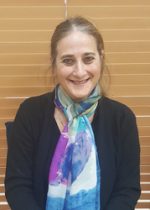קורן חיה, פרופ'

Background
Chaya Koren, PhD, is Senior Lecturer of Social Work, Head of the Ultra-Orthodox BA Program, The School of Social Work – MIVCHAR, and Head of the Center of the Study of Society at the University of Haifa.
Her research interests include late life couplehood, late-life repartnering, late-life divorce (Grey diorce), intergenerational relationships in the family (e.g. older parent-adult child relationship; grandparent-adult grandchild relationship), forgiveness, ageism, the role of social work with the older population.
She is the recipient of several research grants from the prestige Israeli Science Foundation (ISF) (2011-2014) and (2019-2021).
She is also interested in methodological issues in qualitative research such as dyadic and family units and the construction of typologies. She published over 30 articles in peer reviewed journals and book chapters.
Koren used to work as a social work practitioner with families and older members of society in various social welfare organizations.
ד"ר חיה קורן היא מרצה בכירה בבי"ס לעבוד סוציאלית, ראש תכנית ב"א לחרדים וחרדיות וראש המרכז לחקר החברה אוניברסיטת חיפה
תחומי המחקר שלה מתמקדים בזוגיות בגיל המאוחר, זוגיות שנייה בזקנה, גירושים בגיל המאוחר, יחסים בין דוריים במשפחה, גילנות, סליחה, ותפקיד העובד הסוציאלי במסגרות לזקנים
זכתה בתקציבי מחקר מהקרן הלאומית למדע (ISF) בשנים 2011-2014 ובשנים 2019-2021
היא עסקת במתודולוגיה איכותנית במחקר ופיתחה שיטות לניתוח דיאדי, ניתח יחידות משפחתיות מורכבות וטיפולוגיות. פרסמה מעל 30 מאמרים בכתבי עת שפיטים ובספרים
בעבר עבדה כעובדת סוציאלת עם משפחות וזקנים במגון שירותי רווחה.
Research
Year | Amount | Funded by (C= Competitive Fund) | Topic | Other Researchers | Role in Research |
2011-2014 | Total Sum of 444,600 NIS (168,200 NIS each one of the three years) | ISF – Israel Science Foundation (C)
| The meaning of second couplehood in old age from an intergenerational and multi-cultural perspective | none | PI |
2017 – present |
| Ministry of Science and Technology © and National Emergency Management Administration (c) | National Knowledge Center for Disaster and Emergency Management | 85 researchers; Multi-institutional: University of Haifa, Technion, Hebrew University et.al | *Team member |
Oct. 2019 -Sep. 2021 | 334,000 NIS for two years 167,000 NIS for each year | Israel Science Foundation – ISF (C) | The meaning and experience of late-life divorce: A dyadic, a gender and an intergenerational (ex)family perspective | none | *PI |
Publications
Articles in Refereed Journals
Published
- Doron, I., & Koren, C. (2004). The social worker's role in homes for the aged: A twenty year perspective. Journal of Social Work in long Term Care, 3(2), 47-69.
- Also published as Doron, I., & Koren, C. (2005). The role of the social worker in homes for the independent and frail older persons: A perspective of twenty years. Gerontology, 32(1), 39-61. [Hebrew]. V
- Koren, C., & Doron, I. (2005). Being a social worker in homes for the aged: The real, the ideal and the gaps between. Journal of Gerontological Social Work, 44(3/4), 95-114. V
- Also published as Koren, C., & Doron, I. (2005). The role of social work in old age homes: The real, the ideal, and the gap between them. Society and Welfare, 25(2), 185-206. [Hebrew] V
- + Koren, C. & Lowenstein, A. (2008). Late-life widowhood and meaning in life. Ageing International, 32, 140-155. V
- Stock, O., Zancanaro, M., Rocchi, C., Tomasini, D., Koren, C., Eisikovits, Z., Goren-Bar, D., & Weiss, P.L. (2009). The design of a collaborative interface for narration to support reconciliation in a conflict. Artificial Intelligence & Society, 24, 51-59.
- + Koren, C., & Doron, I. (2009). Bridging between the real and ideal practices of social workers in old age homes. Hallym International Journal of Aging, 11(1), 77-89.
- Eisikovits, Z., & +Koren, C. (2010). Approaches and outcomes of dyadic qualitative analysis. Qualitative Health Research, 20(12), 1642-1655. DOI:10.1177/1049732310376520 (I.F. 2.264; 5 year I.F. 2.481; R13/58 in Health Policy Service Q1 for 2010; V).
- Winterstein, T., +Koren, C. (2010). "We take care of the elder but who takes care of us?": Professional workers with elders in a shared reality of war. Journal of Applied Gerontology, 29(6), 772-792. DOI:10.1177/0733464809357427 (see also E.1.)( I.F. 0.985, 5 year I.F. 1.191 R17/30 in Gerontology, Q3, V).
- + Koren, C., & Eisikovits, Z. (2011). Life beyond the planned script: Accounts and secrecy of older persons living in second couplehood in old age in a society in transition. Journal of Social and Personal Relationships, 28(1), 44-63, DOI:10.1177/0265407510385430 (I.F. 1.287, 5 year I.F 1.630, R17/72 in Communication, Q1. V).
- Doron, I., Eyalon, L., Sheuvits-Ezra, S., Bodner, E., Inbar, N., Koren, C., Golander, H., Hazan, H., Carmel, S., Brodsky, J., & Goldberg, A. (2011). Ageism in Israel and Europe: Preliminary findings from the European social survey (ESS), Gerontology, 38(2-3), 73-92.[Hebrew]. V
- + Koren, C. (Oct. 2011). Continuity and discontinuity: The case of second couplehood in old age. The Gerontologist, 51(5), 687-698. doi:10.1093/geront/gnr018 (I.F. 2.481, 5year I.F. 2.939, R6/30 in Gerontology, Q1, V).
- + Koren, C., & Eisikovits, Z. (Nov. 2011). Continuity and discontinuity of violent and non-violent behavior: Towards a classification of male adolescent immigrants from the FSU in Israel, Sociological Focus, 44(4), 314-338.
- Winterstein, T., Eisikovits, Z., & +Koren, C. (Dec. 2011). Between remembering and forgetting: Forgiveness among older battered women. Qualitative Social Work, 10(4): 451–466 doi:10.1177/1473325010361998 (V). Equal contribution.
- Zancanaro, M., Stock, O., Eisikovits, Z., Koren, C. & Weiss, P.L. (2012). Co-narrating a conflict: An interactive tabletop to facilitate attitudinal shifts. ACM Transactions on Computer-Human Interaction, 19( 3), Article 24 (I.F. 1.179, 5 year I.F 1.368, R52/132 in Computer science, information systems, Q2, V).
- Band-Winterstein, T. Koren, C. & Eisikovits, Z. (2013). Memories of older women living in the shadow of intimate partner violence: A retrospective view. Megamot, 49(1), 134-148 [Hebrew]
- Eisikovitz, Z., Koren, C., & Band-Winterstein, T. (2013). The social construction of social problems: The case of elder abuse and neglect. International Psychogeriatric, 25(8), 1291-1298, doi:10.1017/S1041610213000495 (I.F. 1.892, 5 year I.F.2.306, R9/31 in Gerontology, Q2; R47/111 in Clinical Psychology; Q2, V).
- + Koren, C. (2014). Together and Apart: A typology of second couplehood in old age, International Psychogeriatric, 26(8), 1327-1350. doi:10.1017/S1041610214000738 (I.F. 1.934, 5 year I.F.2.273, R10/32 in Gerontology, Q2; R46/119 in Clinical Psychology; Q2, V).
- + Koren, C. & #Lipman-Schiby, S. (2014). “Not a replacement:” Emotional experiences and practical consequences of Israeli second couplehood stepfamilies constructed in old age, Journal of Aging Studies, 31, 70-82. I.F 1.184; 5 year I.F 1.742 R17/32 Q3 in Gerontology (From ISF grant data); V
- + Koren, C. (2015). The intertwining of second couplehood and old age, Ageing and Society, 35(9), 1864-1888. DOI: 10.1017/S0144686X14000294, (F 1.837, 5 year I.F 2.00 R13/32 in Gerontology, Q2, V).
- +Koren, C., & #Simhi, S. (2016). “As long as it’s good”: An intergenerational family perspective of bridging gaps between reality and ideality of second couplehood in old age as a problem and as a solution, Ageing and Society 36(4), 716 – 740 DOI:10.1017/S0144686X14001482, (F 1.837, 5 year I.F 2.00 R13/32 in Gerontology, Q2, V).
- Koren, C. (2016). Men’s vulnerability – Women’s resilience: From widowhood to late-life repartnering, International Psychogeriatrics, 28(5), 719–731 (F. 2.220; 5 year I.F. 2.427 R10/32 in Gerontology, Q2; R38/121 in Clinical Psychology; Q2, V).
- Koren, C., #Simhi, S., #Lipman-Schiby, S. & #Fogel, S. (2016). The partner in late-life repartnering: Caregiving expectations from an intergenerational perspective, International Psychogeriatrics, 28(9), 1555-1565. (F. 2.220; 5 year I.F. 2.427 R10/32 in Gerontology, Q2; R38/121 in Clinical Psychology; Q2, from ISF grant data, V).
- Koren, C. (2018). The experience of change among young violent immigrants serving time in prison: An existential social work perspective, British Journal of Social Work, 48, 54-72(I.F 1.027, 5 year I.F 1.603, R14/41 for Social Work Q2 (was IF 1.335 5year IF 1.802, Q1 R8/40 for social work when submitted), V). 25 pages
- #Simhi-Meidani, S. & Koren, C. (2018). When late-life repartnering and parental death intertwine: Adult children’s perspectives, Journal of family issues, 39(6), 1639-1663. (F 1.697, 5 year I.F 1.688, Family studies 13/43 Q2, V). 28 pages
- *+Koren, C. & Ayalon, L. (2019)."Not living together yet all the time together": The meaning of Living-Apart-Together in Continuing Care Retirement Communities from perspectives of residents and healthcare professionals, Journal of Social and Personal Relationships, 36(11-12), 3855-3874. DOI: 10.1177/0265407519840711 (I.F 1.697, 5 year I.F 2.167 R22/46 family studies Q2; R28/84 Communication, Q2, V). 25 pages
Accepted for publication
- *+Koren, C. & # Simhi-Meidani, S. (2020). Integrating the familial and the cultural: An approach to analyze intergenerational family relationships, British Journal of Social Work, OnLine First (I.F 1.829 R10/42 Social Work Q1, V).
Articles or Chapters in Scientific Books
Published
- Band-Winterstein, T., & , C. (2010). Who gives care to the caregivers?:" A retrospective view of professional workers with older people on shared war reality. In F. Azaiza, N. Nahmiash, & M. Cohen (Eds.), Social, health and education services in times of emergency. Haifa: Pardes. [Hebrew] (p. 229-245).
- + Koren, C. (2013). What is ageism? In I. Doron (Ed.), Ageism in the Israeli Society: The Social Construction of Old Age. Jerusalem: Van Leer Jerusalem Institite/ Hakibbutz Hameuchad Publishing House [Hebrew] (p.28-51).
- + Koren, C., & Zdun, S. (2014). The experience of everyday life among immigrants from the FSU in Germany and Israel. In R.K. Silbereisen, P.F. Titzmann & Y. Shavit (Eds.), The Challenges of Diaspora Migration: Interdiciplinary Perspectives on Israel and Germany. England: Ashgate Publishing Limited (p. 127-145).
- Eisikovits, Z., & Koren, C. (2014). From advising to mentoring to becoming colleagues: an auto-ethnography of mentor-protégé relationship in social work education. In: S.L. Witkin (Ed.), Narrating Social Work through Autoethnography, Columbia University Press. (p. 316-345)
- Eisikovits, Z., +Koren, C. & Guy Becker, G. (2014). Conceptualizing forgiveness in close interpersonal relationships: Towards an integrative theoretical model. In H. Bettez Halnon (Ed.), Webbing Vicissitudes of Forgiveness, Oxford, United Kingdom: Inter-Disciplinary Press. (p. 45-66).
- Ayalon, L., & Koren, C. (2015). Marriage, second couplehood, divorce and singlehood in old age. I. P. Lichtenberg, B, Mast & J. Werethel (eds.), APA Handbook of Clinical Geropsychology, Vol.2: Assessment, treatment and issues of later life. APA Handbooks in Psychology, (pp. 617-644), Washington DC, US: American Psychological Association. 719 pages
- Eisikovits, Z. & Koren, C. (2016). What is forgiveness? Who is involved? How does it function? Towards a theoretical model of forgiveness in close interpersonal relationships In A. Zrihan-Weitzman, Koren & Z. Eisikovits (Eds.) Exploring forgiveness. Tel – Aviv: Resling Publications. [Hebrew].(p. 13-32).
- Band-Winterstein T., Eisikovits, Z. & Koren, C. (2016). Is it possible to live without forgetting and forgiving? The meaning older battered women give to their lives In A. Zrihan-Weitzman, C. Koren & Z. Eisikovits (Eds.) Exploring forgiveness. Tel – Aviv: Resling Publications. [Hebrew].(p. 97-118)

